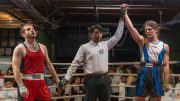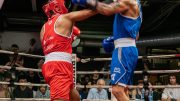Confidently declaring, “I am a survivor of America’s so-called criminal justice system,” at age 73, Rubin “Hurricane” Carter radiates a hale persona and projects a soulful brand of wisdom and honesty.
As a professional boxer earning over US$100,000 a year in the mid 1960s, he had a 36ft yacht and a custom Cadillac, he was a self-proclaimed “big neon sign with a chip on [his] shoulder.” At the height of his boxing career and at the apex of overt racism in America, Carter was falsely accused of triple murder and spent 22 years behind bars as an innocent man. Carter candidly admits that he only escaped execution because he had the money to afford a diligent legal team.
Carter describes the climate of his arrest as a time when “America was not only at war in Vietnam, it was at war with itself.” Despite the public discord and private turmoil, the talented boxer did not succumb to the destructive feelings powerlessness and anger that would have consumed any other person in his position. Instead, he emerged from the trying experience with a vigorous passion for life.
Asking for the lights to be turned on in the darkened auditorium where he took the stage, Carter explained to the crowd that he wanted to be able to see all of our faces; he was obviously there to make a deep connection. Smiling as he delivered his famous line, “Hate put me in prison and love busted me out,” Carter’s positive message was shared with close to 300 students who attended his talk at the University of Manitoba this past Friday.
He began by talking about the movie based on his life story, The Hurricane. After interviewing several actors for the role, including Samuel L. Jackson, Wesley Snipes and Lou Gossett Jr., Carter chose Denzel Washington to play his character, joking that “Denzel can make anyone look good.” Carter went on to recall how he fell in love with Denzel’s vocabulary, with the way Denzel laughed and even the way Denzel walked. Carter then shared his moment of epiphany when he realized that Denzel was “giving me back to me.” Carter was really falling in love with himself and this made him realize how far he had come since prison: “It was going from self-hatred to self-love reflected back to me.”
This is the essence of the Hurricane’s inspiring message. He observes that “no social emotion is more prevalent than personal powerlessness,” and this is what he endeavours to transform. Carter offers a three-step solution to confronting feelings of powerlessness and he maintains that attitude is key. In step one a person must dare to dream. Next, a person must seize every opportunity they can to achieve that dream, acknowledging that when you miss an opportunity, you miss that opportunity forever. The third step is committing to go the distance with your dream.
Calling planet Earth a paradise, Carter maintains that social and personal change is always possible. In a personal context, we can change “as long as we refuse to accept the limitations imposed on us by others and by ourselves.” And in a larger social context, Carter maintains that we will never have any answers if “we think the problem is too big or that our contribution is too small.” These are inspiring words from a man with an inspiring story.
Carter, originally from New Jersey, moved to Toronto after his release from prison in the late 1980s. He became an activist fighting for others who are unjustly imprisoned, working as the executive director of the Association in Defense of the Wrongly Accused from 1993-2005 and is now CEO of Innocence International, which he founded in 2004. Carter has received two honorary doctorate of law degrees from York University and Griffith University, as well an honorary championship title belt from the World Boxing Council.



